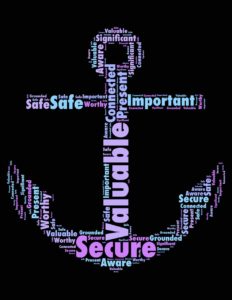
It’s a storm filled world out there. Literal storms, emotional storms, medical deluges, familial hurricanes, political thunderstorms….Storms seem to be everywhere. We need our own personal anchors more than ever to not get blown away.
Anchors as symbols of strength, security, stability, and faith go back several thousand years. Although not seafaring people, early Christians used anchors as symbols of their unshakable faith when they were being hunted and persecuted by the Romans. The phrase “Hope anchors the soul” is derived from a longer verse in the Bible in Hebrews. Nowadays, others have adopted this belief too, and this anchor quote has become quite popular these days on tattoos!
Anchors hold down ships during the stormiest weather. When you drop your anchor, it is self-protective. You know that you are in for a storm, and you are prepared to weather it and get to the other side. The storm may come in the shape of a disease, an accident, a loss, a relationship, a confrontation….You may have time to prepare your ship, or it may come upon you without warning. Either way, your anchor will provide emotional stability.
Did you know that ships can have more than one anchor? So can we! The anchor that most people count on is faith, belief, and hope in a higher power that will see you through. However, an anchor can also be a person who you can count on and who always has your back in a storm. An anchor can be a practice like yoga or walking meditation to steady you. A meaningful object or affirmation can also help to anchor us when we are scared or worried. Whatever helps fortify you – do that, believe in that. Stay grounded.
“The important thing about anchors is that they give us roots. They remind us of our values and who we are. They reaffirm what is important to us, and why weathering the storm, without giving into behaviors, is totally worth it.” ~ Claire Milliken








